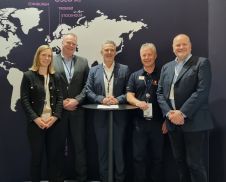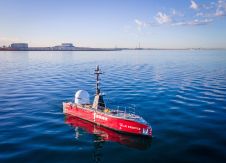Chelsea Technologies, Inc.
Vehicle control and measurement systems
For over 35 years, the name of Chelsea has been synonymous with the development optical sensors and towed vehicle systems for civil and military customers. Now a demand for vehicle control, navigation and related technology within the US homeland defence & military markets has created an opportunity for novel applications of expertise. The Chelsea Technology Group, in conjunction with H Scientific, Ltd, have now developed a range of new systems for the measurement and control (either remote or fully autonomous) of surface and subsurface vehicles.
Chelsea Technologies, Inc. (CTI) was formed in order to bring together a combination of industry expertise and market knowledge. While still providing standard acoustic and optical sensors, CTI also promotes a range of innovative technologies such as an AUV Autopilot and the correlation velocity log. This past summer, the Chelsea Technologies Group (CTG), UK appointed CTI to provide exclusive marketing and sales for North and South America. CTI is a US owned and controlled small business established by Tim Gale, President, with the express purpose of providing a US market with military technology developed in the UK by H Scientific and Chelsea Technologies Group. CTI draws on more than twenty years of experience in the civil and military marine markets.
Current Profile
With headquarters in Solomons (MD, USA), CTI is strategically located in close proximity to key military and civilian decision-makers in the Washington, DC and the Mid-Atlantic regions. Solomons is also home to the renowned Chesapeake Biological Laboratory and Head Office of the Alliance for Coastal Technologies (ACT). As the largest estuary in the USA and a heavily travelled waterway for ships travelling to the Ports of Baltimore and Hampton Roads, the Chesapeake Bay is invaluable for both environmental research and the economy. CTI is well positioned to benefit from the strategically important situation of the Bay.
With the recent heightening of border and port security, underwater surveillance systems, remote control and autonomous vehicle systems are playing an increasingly important role in reducing the global threat of terrorism. In addition, military and naval programme planners have shown keen interest in new autonomous technologies to enhance capabilities ranging from remote-controlled mine hunting to reconnaissance operations.
CTI focuses on this market for remote control and autopilot technologies for unmanned surface and subsea vehicles in North and South America, working closely with its technology providers. Manufacturing, design and product building is undertaken in the UK at ISO9001 (TickiT) and EN46002-accredited facilities. In partnership with CTG and H Scientific, CTI provides technology including both turnkey and customised systems.
Military Products
Chelsea Technologies have been closely associated with H Scientific since 1997. Together they developed COVELIA, a new concept in Correlation Velocity Logs (CVL). After this they went on to jointly develop the 3D-MC autopilot and mission controller. Chelsea Technologies Group, UK provides marine science sensors and associated systems and have more than thirty years experience in developing oceanographic systems to full military specification for the UK Royal Navy.
COVELIA
The COVELIA is a sonar correlation velocity log based on the principles of Acoustic Correlation. It enables AUVs and other submersibles to navigate as accurately as possible without resorting to position-fixing sensors such as GPS. Fundamentally, COVELIA measures the displacement of a 'signature' signal from the seabed between two or more pulses. This means that the system remains accurate down to the lowest velocities, of great importance in AUV operation, where low-speed operations pose problems for Doppler systems. It is expected that the CVL will replace the widely used Doppler Velocity Log in many applications.
AUV Autopilot
The AUV Autopilot Technology is a suite of autopilot algorithms suitable for use on a range of vehicles. These self-tuning algorithms 'learn' the vehicle dynamics by performing a short sequence of manoeuvres; from then on, the optimal controller parameters are applied. This permits accurate vehicle control in varying sea states and load conditions, and also allows for the use of a single control system on a variety of vessels, both surface and sub-surface.
This autopilot technology has been incorporated into a 3D-MC AUV Mission Controller. The 3D-MC includes configurable controller algorithms, providing a number of modes of vehicle control and extensive interface capability, including machinery (e.g. propulsion, control surfaces) interfaces, navigational sensor interfaces and an efficient command communications protocol.
Current projects utilising the COVELIA and AUV Autopilot include the FASTAR USV, which was developed by QinetiQ, the UK-based science and technology organisation. More recently, Chelsea has developed a navigation control and autopilot system for a SEA SHADOW Diver Propulsion Vehicle, used to assist divers transit underwater. The need to deliver Special Forces personnel and equipment to designated mission areas also lead to the development of an autopilot for a Swimmer Delivery Vehicle (SDV). Earlier this year, the Harbin Technical University purchased the COVELIA acoustic correlation velocity log to be integrated with the inertial navigation system onboard an experimental AUV platform.
Other Expertise
While CTI is focusing on military demands, the company continues to supply the Americas with standard physical, biological, optical, and acoustic instruments. The company offers fast-rate fluorimetry, transmissometers, dye tracing, bioluminescence, CTDs, hydrophones and projectors. All sensors are high- precision, yet robust and are routinely integrated into any one of the Chelsea undulating tow vehicles.
The company also provides the Americas with access to expertise on the effect of environmental features on weapon system performance, operational procedures and the impact of oceanographic knowledge on tactical matters. Feasibility studies carried out by Chelsea Technologies Group UK in both the Anti-Submarine Warfare and Mine Counter Measures sectors of the marine environment have lead to some novel sensor developments.
The Tactical Environmental Data Acquisition System (TEDAS) is one such system. It performs as an oceanographic sensor suite and was developed by Chelsea to provide significant tactical advantage. The sensor suite measures physical and biological oceanographic parameters and bioluminescence. As anti-submarine warfare systems become more advanced, knowledge of fundamental oceanographic conditions is increasingly important.
Other such systems include Acous-tic Telemetry Systems and Acoustic modems used for training mine hunting crews and Active Sonar and Passive sonar systems to cover functions such as interception, navigation, obstacle avoidance and high-power tracking pinger output. POSCOM is a Spread Spectrum Underwater Positioning System with a proven range accuracy of better than 5cm rms. In addition, the Versatile Acoustic Source System (VASS) provides a highly versatile and flexible sonar test system using a simple mouse or keyboard selection.
Current and Future Developments
CTI is now focusing on Small Business Innovative Research (SBIR) programmes, working closely with US Navy to develop promising new technology. The company will continue to focus on its established core business areas, with particular emphasis on military applications.
Looking ahead, a new multi-parameter sensor technology is being scheduled for release. This will attract the attention of the Department of Homeland Security for the protection of water supplies, and the US Navy for it's tactical and ship environmental data acquisition systems.
Tim Gale has been an owner-operator in the Marine Industry since 1983. His experience had led him to pay careful attention to the requirements of the US marine community. He brings with him a wealth of knowledge in selling to the US Navy and Coastguard, supporting a range of innovative technologies and in meeting their respective compliance standards and regulations.
CTI has plans to open a manufacturing site in the US to provide better service to its core customer-base. Facilities are currently maintained in Stevensville, Maryland, Alexandria, Virginia and Vancouver Island, British Columbia.

Value staying current with hydrography?
Stay on the map with our expertly curated newsletters.
We provide educational insights, industry updates, and inspiring stories from the world of hydrography to help you learn, grow, and navigate your field with confidence. Don't miss out - subscribe today and ensure you're always informed, educated, and inspired by the latest in hydrographic technology and research.
Choose your newsletter(s)
























